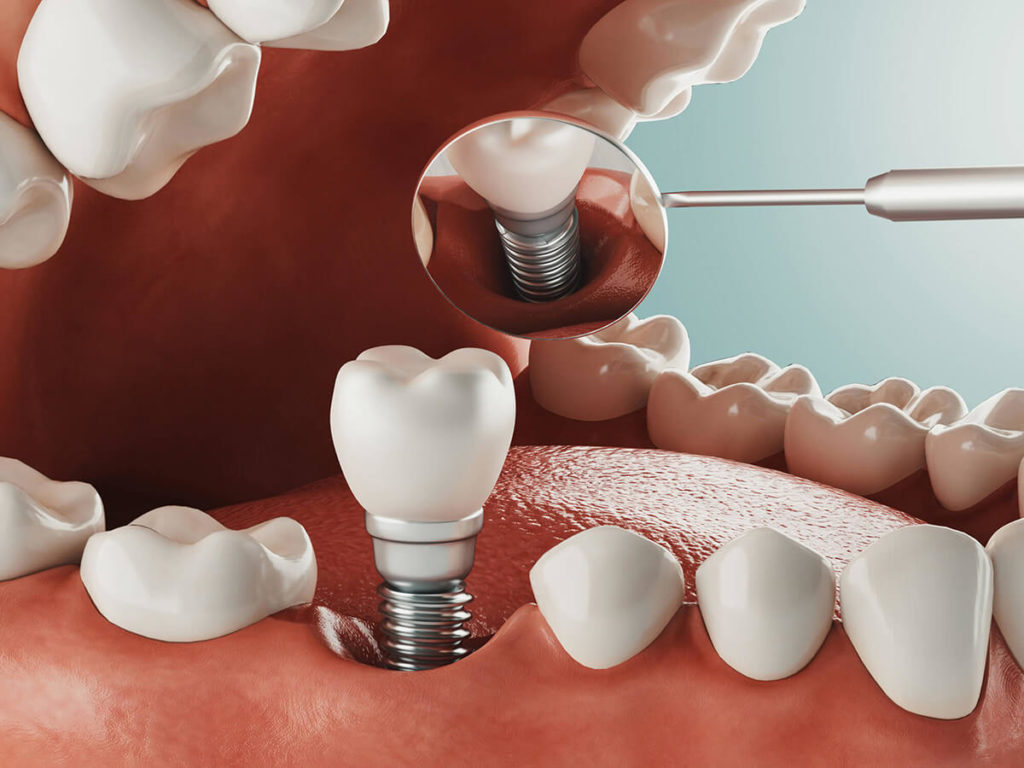Dental Implants
Dental implants are a very reliable source for effective tooth replacement. Whether you have lost one tooth or many, implants can provide a permanent solution that looks and functions naturally.
Dental Implants in Stamford, CT
Dental implants are one of the best tooth replacement options available. They are made of titanium metal and placed below the gumline. During the months following the placement of implants, the bone marrow surrounding the implants grows and holds the implants in place. This lets the implants act as a replacement for the root structure of the missing tooth. After that, an artificial tooth is placed on the implant, connected by a small metal piece (also known as an abutment).
A person suffering from tooth loss will experience many challenges. The most obvious of these challenges are difficulties when chewing and speaking clearly. When tooth loss is left untreated, it can result in very serious problems like tooth shifts, jawbone deterioration, facial structure loss, and bite imbalances. These issues usually develop over time when there is no root system to maintain bone health and alignment. Dental implants provide an artificial root system to maintain order and keep the remaining teeth in line. They can not only help a patient overcome short-term challenges; they can also prevent long-term problems linked to tooth loss.

-
What types of dental implants exist?
Two of the most commonly used dental implants are endosteal implants and all-on-4 implants. Endosteal implants are the most common dental implant option. They are comprised of a titanium metal rod that is installed into the jawbone and a supporting post that is specifically designed to secure either a dental crown or a dental bridge. All-on-4 implants are a revolutionary dental implant system in which an entire top or bottom denture is supported on just four implants. Each implant is strategically placed so that the replacement teeth remain steady and secure. The advantage of using four implants is that it helps promote faster patient recovery and reduces the likelihood of complications from possible implant failure.
-
What is the procedure for dental implants? Are dental implants safe?
The first step is having the dentist consult and visually examine the site in the mouth where the dental implant is being considered. Then the oral surgeon needs to consider if there are any current teeth that need to be extracted and which type of bone graft needs to be conducted. These procedures will take place first and the patient will be allowed a few months to heal to ensure an adequate and strong bone is present at the site of the implant.
Once this is determined, the dental implant is placed into the bone and a healing cap is placed over the implant so the healing phase can begin. This is followed by regular check-ups to ensure proper healing and that there is no infection around the place of surgery.
Read More: Are Dental Implants Safe? -
How much does a dental implant cost?
Dental implant costs vary based on how many teeth you’re replacing, insurance coverage, and the extent of each implant procedure. Typically, implants cost between $2,000 – $3,000 per tooth, which is just for the implant—it does not include the abutment (the piece that connects the implant to the artificial tooth) or artificial tooth.
While out of pocket costs for patients with dental insurance vary on the particular plan, coverage, and limitations, we’re always happy to provide an estimate of cost based on those factors just after your consultation appointment. For those without dental insurance, we work to keep implants affordable by fixing the implant cost and providing flexible payment plan options.
-
Are dental implants covered by insurance?
Some dental insurance plans may cover a portion of the cost of dental implants, particularly if they are considered medically necessary. However, coverage varies widely depending on the insurance provider and the specific terms of the policy. It’s essential to check with your insurance company to determine coverage.
-
How long do dental implants last?
With proper care and maintenance, dental implants can last a lifetime. However, their longevity may vary depending on factors such as oral hygiene, overall health, and lifestyle habits.
Questions About Dental Implants?
If you're interested in dental implants or have any questions—contact us today.

